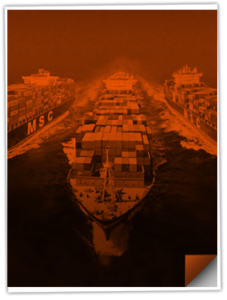ILA Labor Strike Updates
- September 30, 2024
Due to the current ILA strike, Shapiro will be providing daily morning updates with the latest developments until significant changes arise. We are also closely tracking carrier updates and shipment notices, which can be accessed below.
UPDATE: FRIDAY, 10/4
The International Longshoremen’s Association (ILA) and the United States Maritime Alliance (USMX) have tentatively agreed on wage terms and have decided to extend the Master Contract until January 15, 2025. This extension allows both parties to return to negotiations on remaining issues.
As a result, all current job actions will be halted, and work under the Master Contract will restart immediately.
Shapiro will monitor where vessels will be discharging and will file entries accordingly. We will continue to provide any status updates as they become available.
UPDATE: THURSDAY, 10/3
As we enter day three of the ILA strike, noting the empty negotiation table, more and more steamship lines will be declaring force majeure, a legal clause that allows them to suspend or alter their contractual obligations due to extraordinary circumstances beyond their control. This is common during events like natural disasters, political unrest, pandemics, or other unpredictable disruptions. Here’s what to expect:
- Suspension or Alteration of Services: Shipping lines may alter schedules or cancel shipments to avoid regions impacted by force majeure events. The most dramatic example here is offloading cargo at an alternate port without responsibility for on-carriage/original delivery location obligation. Delivering NY cargo to LA, for example.
- Delays in Delivery: Shipments are likely to face significant delays.
- Exemption from Liability: The declaration of force majeure generally frees the shipping line from liability for delays, non-performance, or other disruptions caused by the event.
- Communication with Stakeholders: Steamship lines typically issue formal notices to shippers, clients, and other stakeholders outlining the nature of the force majeure.
- Cancellation of Contracts or Re-negotiations: In extreme cases, the force majeure clause may allow contracts to be canceled or renegotiated without penalties due to the unforeseen circumstances.
- Increased Costs: Shipping companies may pass additional costs to customers due to rerouting, additional fuel costs, or other logistical challenges created by the force majeure event. Some force majeure declarations may involve surcharges or added fees to cover unforeseen operational expenses.
These actions are typically governed by the terms of the specific contracts in place between the shipping line and their customers, as well as international trade and maritime law. The specific response may also depend on the severity and duration of the event, with long-term disruptions leading to more significant alterations to shipping services.
It is also interesting to note that courts in various jurisdictions have differing views on the validity and enforcement of force majeure. California courts are known to require that the event was “unforeseen;” many courts require that the carrier tries to avoid the event. Certainly, this strike was foreseen, and there are zero steamship lines at the negotiation table. Is that trying? Well, it is certainly trying for American shippers, that much is clear!
Shapiro will continue to monitor this strike and all cargo ramifications. We hope this message was useful and helps clarify declarations of force majeure.
UPDATE: WEDNESDAY, 10/2
Port Houston’s Bayport and Barbours Cut Container Terminal gates are closed and all container operations are suspended for the duration of this work stoppage. ILA-supported public general cargo/multi-purpose facilities are not impacted by the work stoppage.
- Evergreen Line invoked the Force Majeure clause of affected contracts and cargo bills of lading.
UPDATE: TUESDAY, 10/1
As you all are aware, the contract for the International Longshoreman Association (ILA) expired on September 30, 2024, at midnight.
With the strike now in place, we are reaching out to you to ensure you understand the current environment.
There are four different scenarios we will be addressing here: 1) the containers currently on-port and immobile; 2) the containers enroute to port about which we have—and have not—been notified; 3) the containers that have been pulled from port and the empty must be returned; and 4) the containers you are hoping to book and ship.
- Our recourse for “freeing” the containers on-port and immobile is limited. What we cannot answer currently is a) whether storage will continue to accrue; and b) if the cargo has been cleared, whether the duty clock will have started. It is possible the duty clock will only start for the containers that are off vessel, on dock; it seems unlikely that the carriers will be permitted to “arrive” the ship (or start the duty clock) for the containers that remain on the vessel.
- We are seeing notices from many carriers notifying that containers have been diverted from their original destination. Our plan is to make entry only when a correct arrival notice is received. Even still, we may learn subsequently that a container has been diverted and that an entry needs to be cancelled, and re-transmitted. New domestic solutions will often be required as well. We are here to help as best as we can. Then there is the scenario of the containers diverted to ports about which we have yet to be notified. We have two options: we could a) make entry and pay ocean freight (as applicable) as planned, with the understanding that the container may be further diverted (or, heaven forbid, lost!), that the duty clock may start, and that the entry may need to be cancelled and re-transmitted. To avoid these headaches, our inclination is to hold off making entry until firmer information is available. Please advise us immediately if you disagree with this approach.
- For containers that have been pulled from the port and the empty must be returned, we do not yet know if the carriers will “stop the clock” on per diem charges or if the carriers will designate an off-port location for the return of the empties. This applies to chassis and to potential chassis charges as well.
- In terms of upcoming bookings, none of us can project how long this strike will continue. This being an election year, we can only suspect (and hope) that the duration is limited. If the gamble is too risky, there certainly may be other creative options out there that answer the riddle—such as sea-air designs. Please let us know if you want us to assist with this.
UPDATE: MONDAY, 9/30
- As of this morning, the ILA has confirmed plans to strike starting tomorrow, October 1st.
- Dockworkers at the Port of Montreal have initiated a three-day strike at the Viau and Maisonneuve Termont terminals, expected to continue until Thursday morning.
- Meanwhile, a lithium battery fire has temporarily closed several LA Port terminals, compounding congestion on the West Coast already impacted by the ILA strike.
- West Coast rail dwell times are currently at 7-10 days for LA and 12 days for SeaTac rails. These will increase in the event of a strike.
- Carriers are announcing PDS charges of between $1000 and $3000 per FEU.
- Some carriers are cancelling sailings to EC/Gulf depending on the origin.
Carrier Diversions
| Service | Vessel | Omitted Port(s) | Alternate Discharge Port |
| CBX | APL ESPLANADE 0XR60W1MA | SAVANNAH | CHARLESTON |
| CLOSUEZ | APL SENTOSA 1TU9FN1MA | SAVANNAH/CHARLESTON | TO BE DETERMINED |
| LIBERTY | MH PERSEUS 0LBHOE1MA | SAVANNAH | CHARLESTON |
| CBX | CMA CGM RIMBAUD 0XR62W1MA | SAVANNAH/CHARLESTON | TO BE DETERMINED |
Carrier/Customs Notices
Evergreen, 10/2/24:
Evergreen Invokes Force Majeure Following ILA Strike
CBP, 10/2/24:
Cargo Systems Messaging Service
CBP, 9/30/24:
M + R Advisory, 9/30/24:
Possible Strike of International Longshoreman’s Association (ILA) Beginning October 1st, 2024
FMC, 9/30/24:
Additional News
In Baltimore, Dockworkers’ Strike is the Second Economic Hammer Blow for the Port This Year



